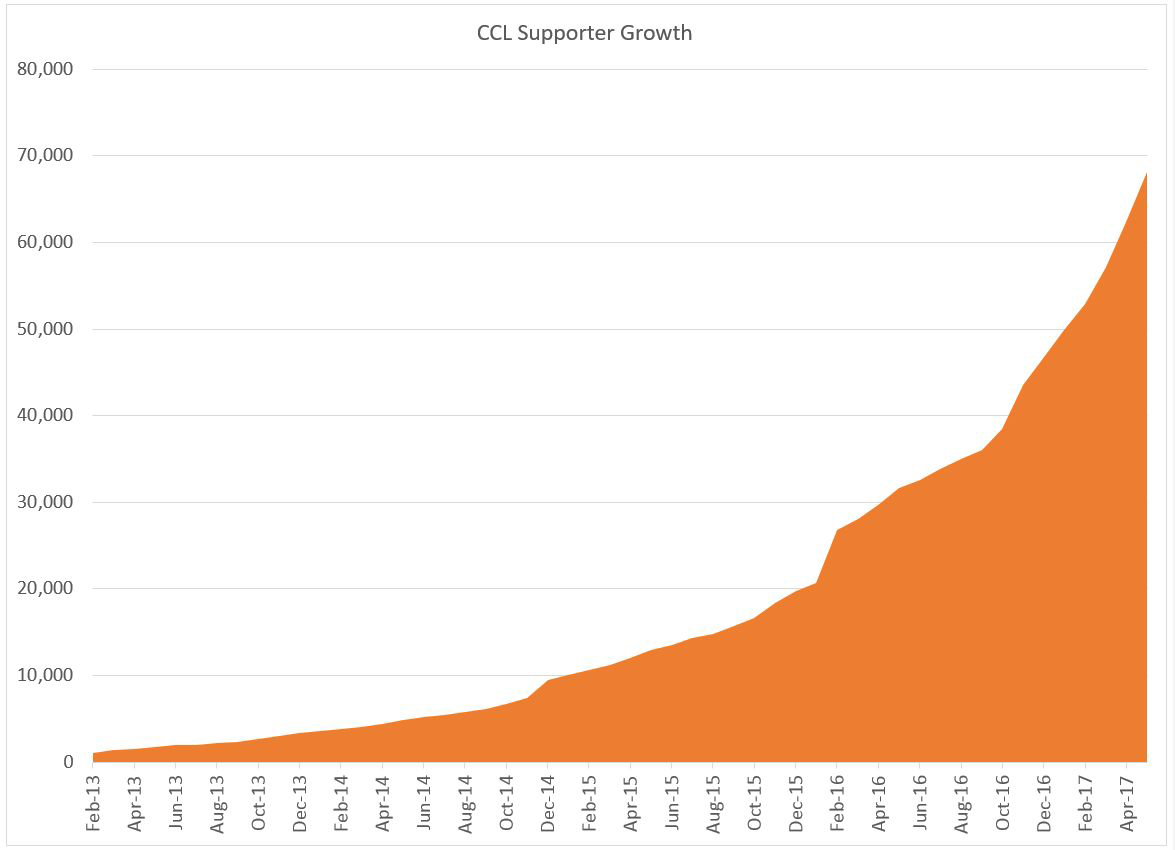
Citizens Climate Lobby’s (CCL) NH South Central chapter leader volunteer, John Gage with his daughter meet with Representative Ann Kuster of New Hampshire in Washington D.C. They were among the 1000 CCL volunteers who lobbied 500 congressional offices in teams on June 13, 2017. Photo courtesy John Gage.
by John Gage
Recent federal administration decisions that ignore the strong recommendations of science, and proposals to remove funding from basic scientific research are provoking a strong reaction from educated, concerned citizens across the country. People are being moved by events and increasing their civic engagement, and many are feeling the call to get involved for the first time.
Volunteer groups like Citizens Climate Lobby and organizations like The Union of Concerned Scientists are founded on the enormous potential and benefits of using scientific knowledge and vision to help direct policy decisions for the United States, and the grave risks to the country and world in not doing so. The conclusions of climate science about man-made global warming and ocean acidification are certain, and necessitate a rapid reduction in greenhouse gas emissions from burning fossil fuels. Nearly every other country in the world sees this clearly, as indicated by the near-unanimous global participation in the Paris Climate Accord. By deciding to drop out, our country is ignoring a leadership opportunity that the whole world knows will require US participation to solve. It will take the technological and investment power of the United States to lead the world on a clean energy path on the timeline that science indicates is required. The United States could ensure continued growth of our economy and jobs throughout this century by leading in new, clean energy solutions, and leadership in energy in the 21st century is ours to lose. China and others, by focusing on the problem more directly, are now in position to take the lead.
The response across our country to these “isolationist,” anti-science, irresponsible actions is reflected in the volunteer growth rate of Citizens Climate Lobby (CCL). CCL is a ten years old, grassroots, nonprofit, nonpartisan organization that formed to help Congress address human-caused climate change. It is one of the fastest growing of such groups, working to create the political will for climate solutions through public outreach, collecting business endorsements, and directly lobbying Congress to provide the tools and support necessary to address the problem in a way that will help the U.S. economy and households. Using the RESULTS methodology, CCL takes a respectful approach to government leaders, and by making personal connections to build trust and a collaborative partnership with Congress, CCL has gained respect and developed strong relationships in Congress.
CCL membership growth has accelerated this year. Before the election, CCL averaged 395 new supporters per week. Afterwards growth climbed to nearly 2.5 times that rate, and by the end of May, membership exceeded 68,000 volunteers. Much of this growth comes directly through the CitizensClimateLobby.org website.
This growth in membership is translating into more letters to the editor, more public outreach, more meetings with Congress, and more effect on Congress. For example, two years ago CCL worked with Congress to create the bipartisan House Climate Solutions Caucus. This caucus had 16 members at the end of December, and grew to 42 members by the beginning of June this year. To enable this caucus to remain bipartisan, membership is kept even at 50% Democrats and 50% Republicans. By raising awareness of this caucus to all members of Congress, and promoting a policy solution that both parties can support, CCL is creating a substantial forum for leaders of both parties to come together to discuss the problem and possible solutions.
“Americans from across the political spectrum are demanding that Congress put politics aside to act on climate change,” said Representative Deutch of Florida, one of the co-founders. “The remarkable growth and diversity of this Caucus sends a clear signal to the White House and the American people that Congressional Democrats and Republicans are ready to work together on paramount issues like climate change.”
Another group taking an active role in the effort is the Union of Concerned Scientists (UCS). UCS is nearly fifty years old, and since its creation has focused on helping enable Congress to make science-based policy decisions in a wide variety of areas, and to promote policies to use scientific research responsibly and for purposes that benefit society. It was founded to help redirect research from military technologies and toward solving pressing environmental and social problems. Most recently, climate change has become a focus of many of the group’s efforts.
Over 30 nations have already put a price on carbon emissions. For example, British Columbia passed a carbon tax in 2008. CO2 emissions fell, fossil fuel consumption decreased, and the economy remained robust. Last year, the rest of Canada decided to follow suit. In fact, of the ten largest economies in the world, only three have not put a price on carbon: Russia, Brazil, and the U.S., and Brazil is considering doing so. China has taken the lead in clean energy technology and manufacturing because their directed economy has been focused in this growth area. We need a market based solution to steer investment and manufacturing might of the United States from fossil fuels to clean energy, for the good of the climate, and to position our country as a leader in energy for this century.
Given the need to greatly reduce greenhouse gas emissions to protect the climate for the near and distant future, and the enormous potential for jobs in clean energy solutions, it is encouraging to see an acceleration of the interests in addressing climate change from fossil fuels with a market-based, revenue neutral solution.
John Gage is a volunteer for Citizens Climate Lobby and is the CCL NH South Central chapter leader, http://bit.ly/CCL-NHSC.





















